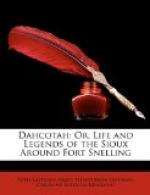Wabashaw often spoke of the ill treatment he received on his journey. It was bad enough to be a prisoner, and to be leaving home; it was far worse to be struck, for the amusement of idle men and children—to have the war eagle’s feather rudely torn from his head to be trampled upon—to have the ornaments, even the pipes of the nation, taken away, and destroyed before his eyes.
But such insults often occurred during their journey, and the prisoners were even fettered when at last they reached Quebec.
Here for a long time they sighed to breathe the invigorating air of the prairies; to chase the buffalo; to celebrate the war dance. But when should they join again in the ceremonies of their tribe? When? Alas! they could not even ask their jailer when; or if they had, he would only have laughed at the strange dialect that he could not comprehend. But the Dahcotahs bore with patience their unmerited confinement, and Wabashaw excelled them all. His eye was not as bright as when he left home, and there was an unusual weakness in his limbs—but never should his enemies know that he suffered. And when those high in authority visited the prisoners, the haughty dignity of Wabashaw made them feel that the Dahcotah warrior was a man to be respected.
But freedom came at last. The murderers were given up; and an interpreter in the prison told Wabashaw that he was no longer a prisoner; that he would soon again see the Father of many waters; and that more, he had been made by the English a chief, the first chief of the Dahcotahs.
It was well nigh too late for Wabashaw. His limbs were thin, and his strength had failed for want of the fresh air of his native hills.
Little did the prisoners care to look around as they retraced their steps. They knew they were going home. But when the waters of the Mississippi again shone before them, when the well-known bluffs met their eager gaze; when the bending river gave to view their native village, then, indeed, did the new-made chief cast around him the “quiet of a loving eye.” Then, too, did he realize what he had suffered.
He strained his sight—for perhaps his wife might have wearied of waiting for him—perhaps she had gone to the Land of spirits, hoping to meet him there.
His children too—the young warriors, who were wont to follow him and listen to his voice, would they welcome him home?
As he approached the village a cloud had come between him and the sun. He could see many upon the shore, but who were they? The canoe swept over the waters, keeping time to the thoughts of those who were wanderers no longer.
As they neared the shore, the cloud passed away and the brightness of the setting sun revealed the faces of their friends; their cries of joy rent the air—to the husband, the son, the brother, they spoke a welcome home!
Wabashaw, by the command of the English Governor, was acknowledged by the Dahcotahs their first chief; and his influence was unbounded. Every band has a chief, and the honor descends from father to son; but there has never been one more honored and respected than Wabashaw.




